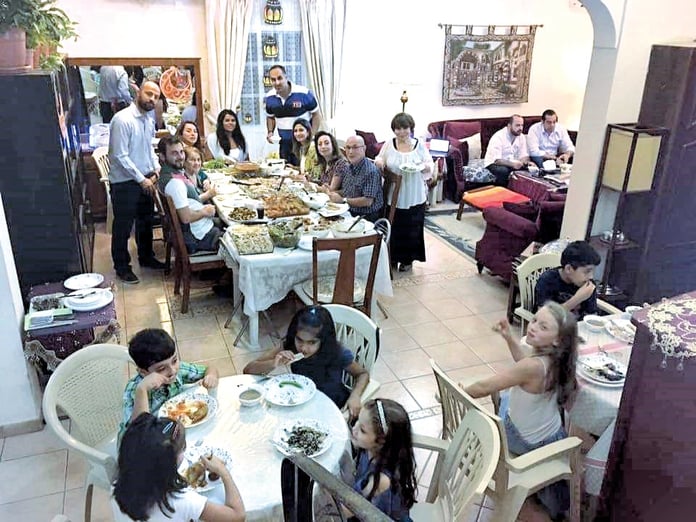From Lebanon.. Mrs. Jumana Al-Qadi narrates to us the most prominent customs and traditions practiced by the Lebanese in preparation for the holy month of Ramadan. . She pointed out that the preparations begin several days before the start of the month, as the women clean the houses, add decorations, lighting and prepare the necessary ready-made food. Mrs. Al-Qadi said that Muslims in Lebanon still preserve the custom of the Ramadan cannon, which dates back to the Fatimid era, in order to inform people of the time of fasting and breaking the fast. She added: An old habit called “Sibana Ramadan” spreads in the capital, which is a picnic to one of the beaches on the last day of Sha’ban, and is devoted to eating what people crave from food, drinks and even sweets in preparation for abstaining from it during the day throughout the days of Ramadan. Lebanon, with its ancient cities, lanes, and beautiful villages, still preserves the Masharati who roams the streets at the time of suhoor to wake people up, as he beats on a small drum, repeating some phrases such as “Oh, the one who sleeps, unite the permanent,” and the phrase, “O people, get up for your suhoor … Ramadan has come to visit you.” Al-Masaharati memorizes the names of the people of the neighborhood and calls them to wake them up, and then they, in turn, honor him in return for the effort he makes throughout the month of Ramadan. And Muslims in Lebanon revive the days of the holy month by praying, reading the Qur’an and supplication, and this is in the mosque or in the places designated for worship, and many are keen to perform Tarawih prayers in the mosque. Mrs. Jumana said that Ramadan in Lebanon has changed its customs, traditions and beautiful rituals, as family members gather on the first day at one table to eat breakfast with the head of the family, and then visits between family and friends take place after Tarawih prayers, and she said we prepare a schedule for the blessed month of Ramadan so that the Eating breakfast every day with one of the family members, and also the family members staying up late together, then they eat the suhoor together, and then they go to sleep.
About the most prominent foods in the famous Lebanese cuisine, Mrs. Jumana said that the Lebanese cuisine is known for its various dishes, especially during the holy month of Ramadan, where many types of food and appetizers are prepared, which usually overflow to the next day, and dishes are exchanged between neighbors and family members, which is an old habit. It still exists to this day. Mrs. Jumana said: The Lebanese cuisine is known for its richness and diversity, and during the month of Ramadan in particular, many dishes are available on the tables of Lebanese families, most notably soup of all kinds, fattoush salad, tabbouleh, tahini with chickpeas, spiced sham hummus and molokhia, and also among the most famous foods are kibbeh of all kinds and stuffed grape leaves. Lebanese tables also know special drinks for this holy month in the form of julep, tamarind, liquorice, carob, and qamar al-din. In addition to the Ramadan sweets that give evening parties a special taste, the most prominent of which are qatayef, mashabq, shuaibiyat, kunafa, rice with milk and the famous cheese sweetness, as well as nuts such as almonds, walnuts and pistachios. Ramadan rituals, Mrs. Jumana explained that she has been living with her family members here in Qatar for several years and practices the same rituals where the family gathers at one table and also prepares the most famous and best Lebanese and Qatari dishes. We love to eat Gulf food such as majboos, harees, and other items, and the religious aspect has a great deal of space in this holy month, as we see mosques full of worshipers, and people also flock to popular markets such as the endowment market and others to buy the requirements of the holy month. And she said that Ramadan in Lebanon is not much different from Ramadan in Qatar, as the spirituality of this holy month is present. Mrs. Jumana indicated that work pressures have separated family members from one another. On normal days, family members may not gather to eat due to the different working hours. In the blessed month of Ramadan, everyone gathers at the iftar table, so that working hours are unified, and it has become necessary for everyone to meet at the same time. The breakfast cannon, whatever their obligations during the day, and this brings them closer to each other and makes them familiar and loving, and she stressed that in Lebanon, too, the family must reconcile their times to meet at the abundant breakfast table, and indicated that with the development of time and the introduction of social media and many modern technologies, it may be lost The holy month has some of its aesthetics but still maintains family bonding.

